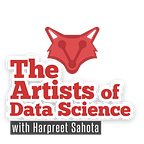Level Up Your Leadership | Pooja Sund on The Artists of Data Science
On this episode of The Artists of Data Science, we get a chance to hear from Pooja Sund, a technology leader who has over two decades of global technology and financial experience delivering business and organizational impact across a variety of roles.
Her contributions and expertise have led her to be a powerful leader and energizer, and she currently serves as the Director of Technology and Analytics at Microsoft. She gives insight into her journey into working for Microsoft, her tips to becoming more self-aware, and how she energizes her teams.
Pooja shares with us his powerful journey from switching career paths and landing her dream job at Microsoft. This episode is packed with advice, wisdom, and tips about cultivating a growth mindset. It was a great honor interviewing Pooja!
Some notable segments from the show
[8:57] Leadership skills that you aren’t taught in school
[10:29] What Pooja looks for in data scientists
[17:38] How to ask yourself the right questions to cultivate a growth mindset
[24:32] How to develop self-awareness to know what tools you have
[27:31] Advice for women in tech
Where to listen to the show
Listen to the episode on Apple Podcasts, Spotify, Overcast, Stitcher, Castbox, Google Podcasts, TuneIn, YouTube, or on your favorite podcast platform.
Pooja’s journey into data
Pooja was initially interested in becoming a doctor, but this changed when didn’t get into the university that she wanted to. She changed her career path, and instead decided to go for an MBA. She realized that she had been so focused on becoming a doctor to serve the broader community, but she realized that she can serve the community by analyzing data.
During her MBA program, one her professors asked where everyone saw themselves after completing their MBA. Pooja wanted to join Microsoft, and she had unflinching faith in her capabilities to get there.
Did you find yourself in your excellence zone? I’m not talking about the time when you are in your great mode, zone or let’s say this is a best zone. I’m talking about the zone where you can call yourself as being an excellent person because you’re just lose track of time. And I feel that when I am working on the projects, setting was analytics and technology, I just lost track of time. So I found my passion and they embraced it with open heart
Key takeaways from the episode
Leadership skills that aren’t taught in school
[8:57] You need to be able to see the big picture. You need to know how to think outside the box, and be able to connect your organizational goals with the goals of your team.
Important soft skills
[9:49] You need to learn strategic thinking, negotiation, and the ability to network in and out of your organization.
Three key questions to ask stakeholders
[13:15]
- What is that thing that we are trying to solve?
- What is the risk involved here? What would happen if an alternate course is taken?
- Is this a high priority project? How does this help the organization as a whole?
What do you look for in a data scientist?
[10:29] Have the curiosity to learn. When I interview candidates, I look for someone who is open to learn, and has been that way in their career path. I look for someone who is proactive and creative, and is able to connect the dots between multiple projects and skills. I look for candidates that can influence without authority, and collaborate well with others.
Mindset
[17:38] The way data scientists analyze data sets should be how they analyze their own mind. Ask questions regarding outcomes and what you want to achieve. This will allow you to focus your energy on the appropriate tasks, without wasting time and every opportunity that comes your way.
How to develop self-awareness
[24:32] When I talk about self-awareness, I mean the capability to conquer yourself before you can conquer the world. I call this executive presence. You might think that you need to keep learning more to begin solving problems, but sometimes you need to take a step back and realize that you already have the tools. Pause and evaluate yourself.
Advice for women in tech
[27:31] Be you, not someone else. Don’t hesitate, and be assertive.
Memorable quotes
[7:03] “You need to really look at the things that are in front of you and decide what are the things that excite you…”
[12:42] …”Rather than jumping in, take time to understand the problem.”
[24:42] “I have seen people, including me, thinking that… I need to keep on learning…there’s nothing wrong with it but at times you’ll need to really look at the arsenal that you have created for yourself.”
The one thing Pooja wants you to learn from her story
[27:52] Follow your passion, and combine your passion with your leadership persona and create your own brand.
From the lightning round
Favorite question to ask during an interview
What is your superpower?
Recommended book
“Data Science from Scratch” by Joel Grus
Books and other media mentioned in this episode
“The Alchemist” by Paulo Coelho
“Johnathan Livingston Seagull” by Richard Bach
Where to find Pooja Online
Episode Transcript
You are welcome to share the below transcript (up to 500 words) in media articles (e.g., The New York Times, LA Times, The Guardian), on your personal website, in a non-commercial article or blog post (e.g., Medium), and/or on a personal social media account for non-commercial purposes, provided that you include attribution to “The Artists of Data Science” and link back to the https://theartistsofdatascience.fireside.fm/articles URL.
For the sake of clarity, media outlets with advertising models are permitted to use excerpts from the transcript per the above.
The transcript for this episode can be found here.
